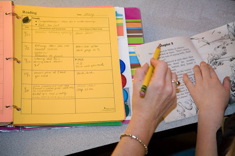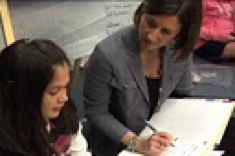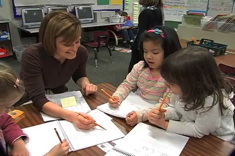Teachers are continually refining our thinking and assessments as we work with children, documenting and assessing reading and writing skills. For the past few months, I met with a dedicated group of early childhood through high school literacy teachers to dig deeper into what we believe about literacy instruction, and make practical and doable plans for our teaching.Â
Our particular focus was comprehension, as well as the connections students make to the stories and texts they read. In addition to helping them become more skillful readers, I also want the young people with whom I work to be more confident, passionate lifelong readers. I want them to be able to be active members of a community of readers, part of the discussion and give and take group conversations can provide. I want my assessments to look for evidence that will support their growth toward these goals.
I have created a list of “Seven Questions” to hold in my mind as I am assessing students’ reading, helping me to look for evidence that will support continued growth. These questions are a beginning: I invite you to revise and add to them as you learn from colleagues and students at your school.
1. What evidence do I have that the student is able to relate the reading to other human experience, especially her own?
This shows whether she can generalize and abstract information as well as enjoy the book in a more personal way.
2. What evidence do I have that the student is able to accept responsibility for making meaning out of the literature and the discussions?
This helps me understand whether he is an independent thinker, genuinely making the kinds of connections that help him form opinions about his reading, or depending on others to tell him “what it means.”
3. What evidence do I have that the student is able to recognize differences and similarities in the visions and ideas offered by different texts?
Does she draw on her reading history and adjust her thinking as she acquires a wider range of ideas and views?
4. What evidence do I have that the student is willing to express responses to what he reads?
Is he timid? Unfocused? What can I do to help him?
5. What evidence do I have that the student is able to tolerate and accept others’ opinions of the work?
Is she receptive to the ideas of others, willing to change her mind and treat her beginning response as a draft, to revise her opinions? Is he able to challenge others in a cooperative rather than combative way?
6. What evidence do I have that the student is able to enjoy the reading?
Can she say why she likes it or doesn’t like it?
7. What evidence do I have that the student can take another perspective in his reading?
Even very young children can learn to see things through another’s eyes. Is this happening? What can I do to encourage it?






